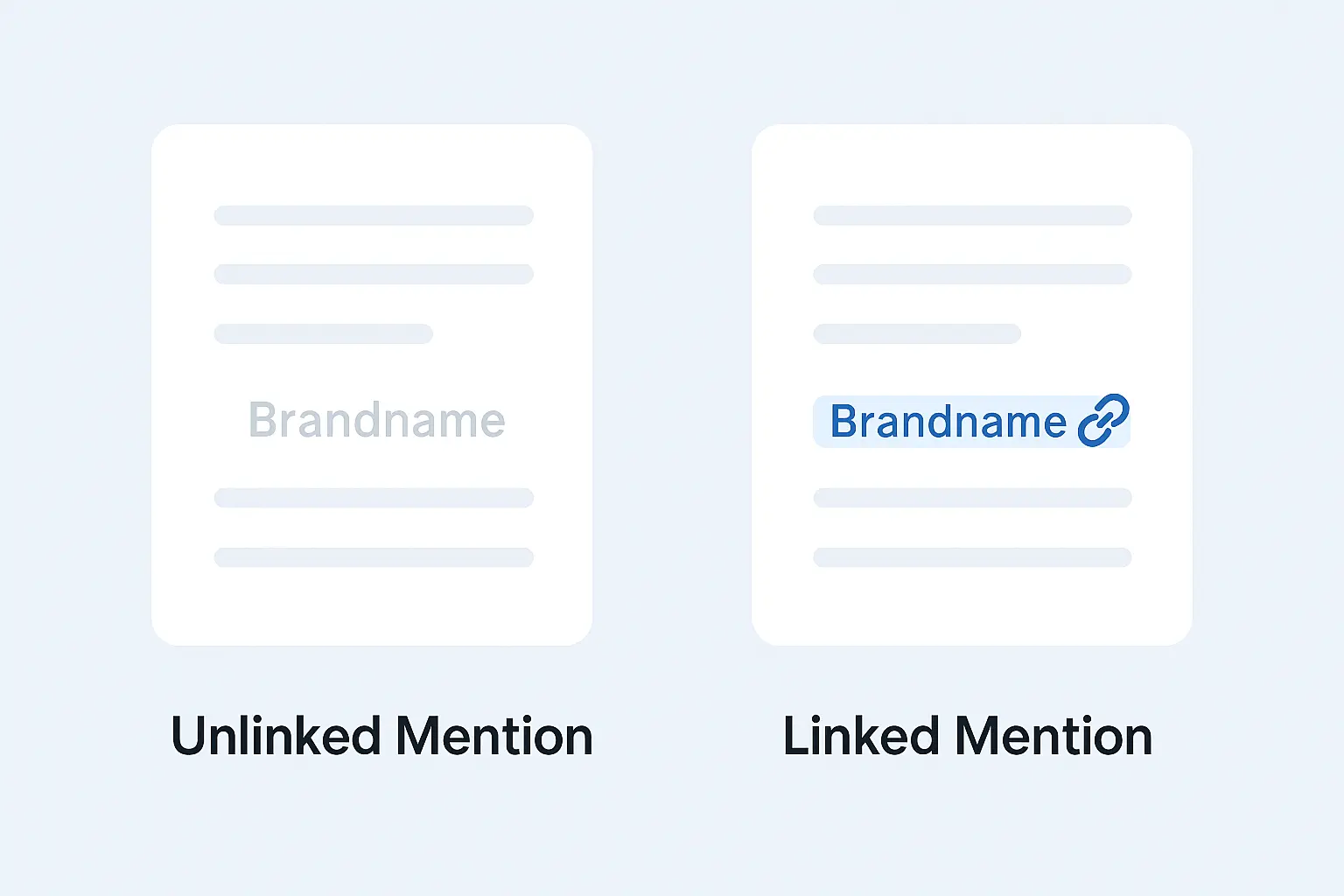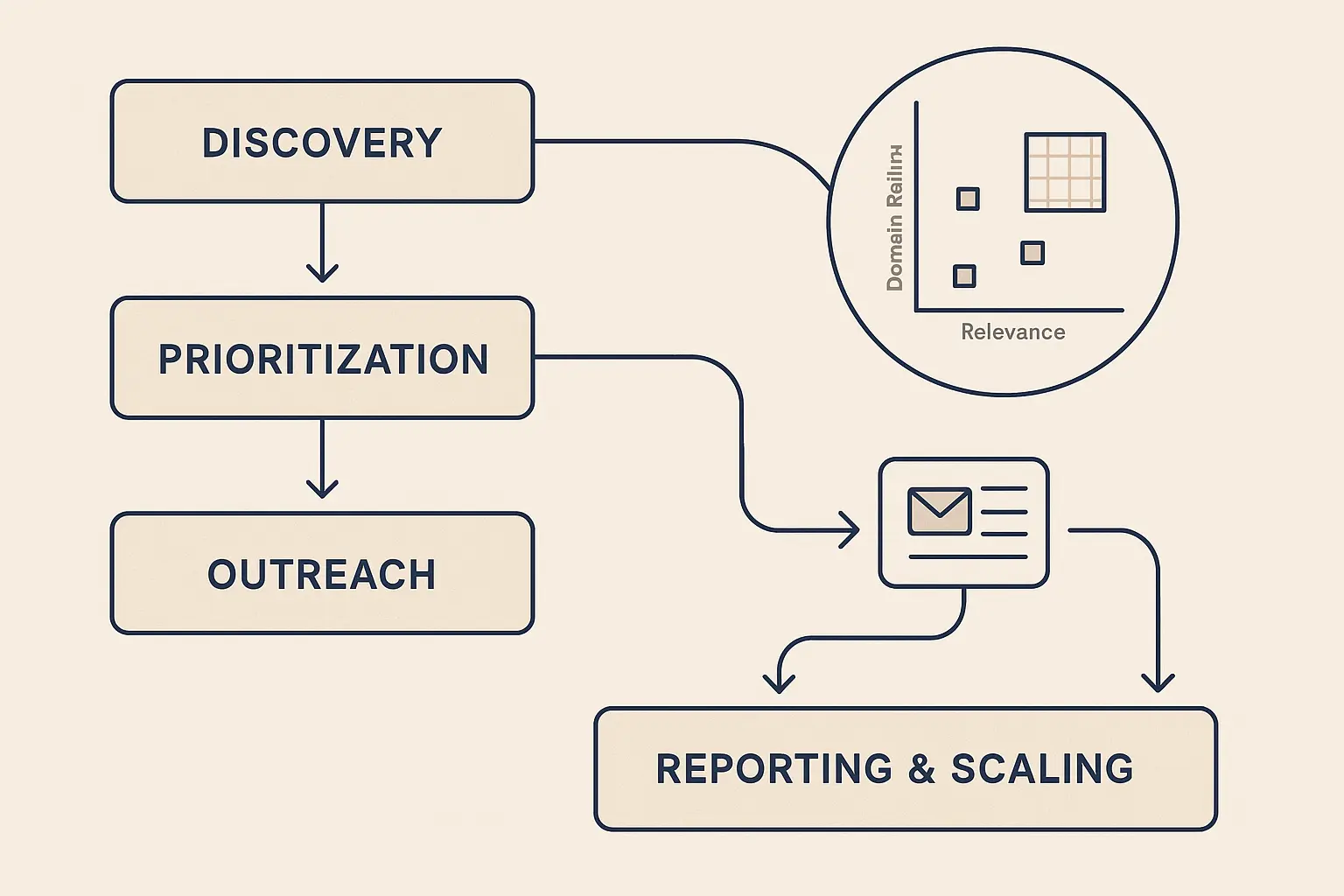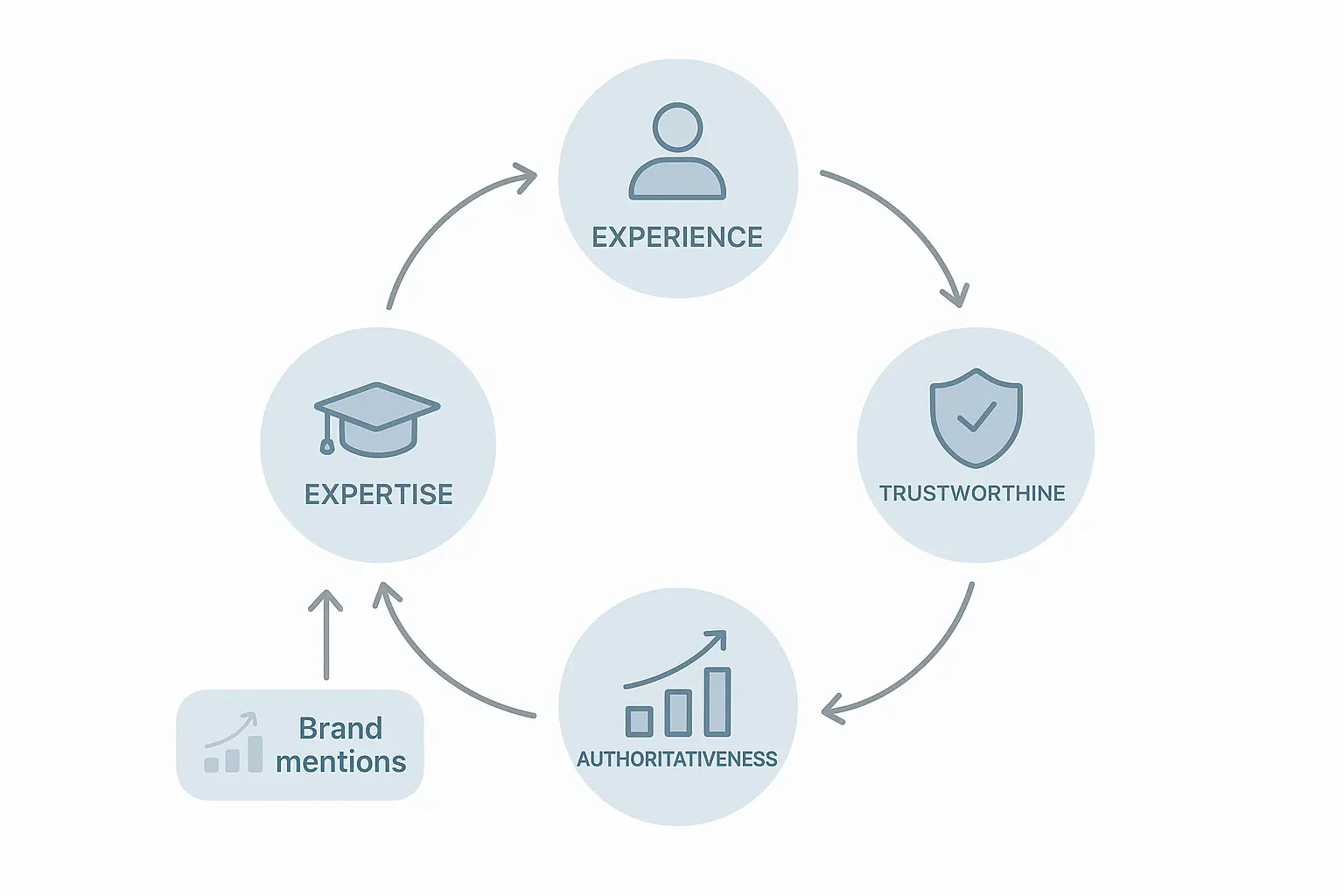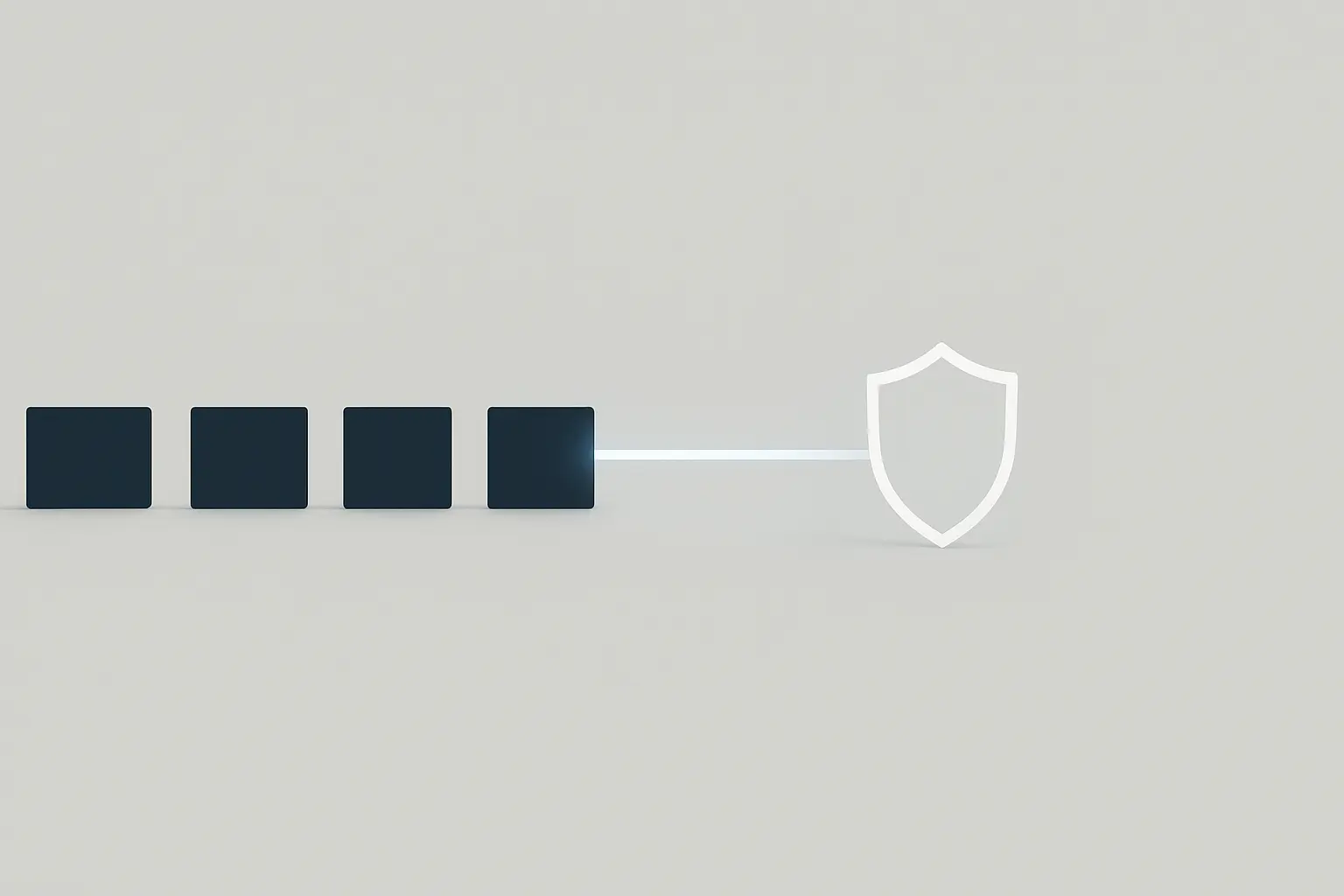Imagine this: your client is killing it. They’re featured in industry blogs, mentioned in news articles, and praised on review sites. Their brand visibility is soaring. But when you check their SEO performance, their domain authority is flatlining. What gives?
You’ve stumbled upon one of the biggest missed opportunities in digital marketing: the unlinked brand mention. It’s the digital equivalent of a standing ovation no one records—a powerful signal of authority that search engines can’t fully credit. With over 90% of customers stating that positive reviews influence their purchasing decisions, every mention matters. But it’s turning those mentions into links that transforms passive praise into active SEO power.
This playbook is for agencies ready to move beyond traditional tactics and unlock a scalable new service for their clients. We’ll break down how to find these hidden gems and systematically convert them into powerful authority signals.
What Are Unlinked Brand Mentions (and Why Do They Matter)?
An unlinked brand mention is exactly what it sounds like: a citation of a client’s brand, product, or key personnel online without a hyperlink back to their website.
Think of it as a conversation about your client where the speaker forgets to point people in their direction. It’s a sign of relevance and authority, but it leaves a massive amount of SEO value on the table. Without a link, you miss out on:
- Direct Authority Transfer: Backlinks remain one of the top three most important ranking factors for Google. A link from a reputable site acts as a vote of confidence, passing authority (or “link equity”) to your client’s site and boosting its E-E-A-T (Experience, Expertise, Authoritativeness, and Trustworthiness).
- Qualified Referral Traffic: Links don’t just help search engines—they help people. Someone reading about your client’s great service is a highly qualified lead, and a link gives them a direct path to convert. Referral traffic is often the most targeted and highest-converting traffic source.
- Improved Indexing: Links help Google’s crawlers discover and index new pages on your client’s site more efficiently, ensuring their latest content gets seen.
Reclaiming these mentions isn’t just about SEO. It’s about solidifying your client’s digital footprint and ensuring they get full credit for the reputation they’ve already earned.
The Hidden Goldmine: Quantifying the Opportunity
For any established brand, the number of unlinked mentions waiting to be discovered is staggering. They hide in plain sight on forums, blogs, news sites, and partner websites. Each one is a warm lead for a high-quality backlink because the hardest part—establishing relevance and getting the mention—is already done.
You aren’t asking for a favor; you’re simply suggesting an improvement that helps the publisher’s audience.
This process taps into the goodwill your client has already built. Because these mentions often appear on highly relevant, authoritative sites, they can be more valuable than links acquired through traditional cold outreach. It’s particularly potent for service-based clients; after all, 86% of consumers use Google to read reviews for local businesses. Securing a link from a positive review is a home run.

Your Scalable 4-Step Playbook for Brand Mention Reclamation
Transforming this opportunity into a repeatable service requires a system. Here’s a simple, four-step process your agency can implement for every client.
Step 1: Identify & Discover
First, you need to find where people are talking about your client. While you can start with a free tool like Google Alerts, specialized monitoring tools provide more comprehensive data.
What to Monitor:
- Brand Name (e.g., “JVGLABS”)
- Product/Service Names (e.g., “White-Label SEO Execution”)
- Key Executive or Founder Names (e.g., “Jane Doe, CEO of…”)
- Unique Slogans or Taglines
Tools for the Job:
- Brand Monitoring Tools: Brand24, Mention
- SEO Suites: Ahrefs’ Content Explorer, Semrush’s Brand Monitoring Tool
- Free Option: Google Alerts (less real-time, but a good starting point)
Your goal is to cast a wide net and compile a master list of every online mention.
Step 2: Qualify & Prioritize
Not all mentions are worth pursuing. Chasing a link from a low-quality, irrelevant blog is a waste of time, so you need to prioritize to maximize your team’s impact.
Create a simple scoring system based on:
- Site Authority: Is the website reputable? Use metrics like Domain Authority (Moz) or Domain Rating (Ahrefs) as a quick filter. Focus on sites with decent authority first.
- Relevance: How relevant is the website and the article to your client’s industry? A mention on a niche industry blog is often more valuable than one on a generic news aggregator.
- Context: Is the mention positive or neutral? Pursue links only from favorable contexts. A negative mention is valuable intelligence for your client’s PR team, but not for link reclamation.
Your highest priority targets will be mentions on high-authority, highly relevant websites where the context is positive.
Step 3: Craft Your Outreach
This is where human strategy shines. A personalized, polite, and value-driven email is far more effective than a generic template.
The Key Ingredients of a Successful Outreach Email:
- A Specific Subject Line: “Quick question about your article on [Article Topic]” works well.
- Genuine Appreciation: Start by thanking them for mentioning your client. Be specific about the article.
- The Gentle Ask: Frame your request as a benefit to their readers. Instead of “Can you add a link?”, try “I was wondering if you’d be open to adding a link to [Client’s Brand]. It would help your readers learn more about the solution you mentioned.”
- Make It Easy: Provide the exact URL you’d like them to link to. Don’t make them search for it.
Remember, you’re building a relationship, not just a link. Keep it short, friendly, and focused on mutual benefit.
Step 4: Track & Report
To prove the value of this service, meticulous tracking is essential. Use a simple spreadsheet (or your agency’s project management tool) to log:
- The URL of the mention
- The site’s Domain Authority
- Date of first outreach
- Date of follow-up
- Status (Link Acquired, Responded, No Response)
This data lets you report clear wins to your client—”This month, we converted 15 brand mentions into high-authority backlinks, strengthening your site’s SEO foundation.”
Scaling the Process: From Manual Task to Profitable Service
The playbook above works perfectly for a handful of mentions. But what happens when you discover hundreds for a single client, and you have ten clients? The manual effort quickly becomes a major bottleneck, preventing your team from focusing on higher-level strategy.
This is where systematization becomes critical. To offer this as a scalable service, agencies need a process that blends intelligent automation with human oversight. An efficient workflow streamlines the discovery, qualification, and tracking stages, freeing up your team to focus on personalized outreach. This is how an AI-powered SEO approach, supported by a white-label SEO partner, turns a time-intensive task into a profitable, highly effective offering.

Frequently Asked Questions (FAQ)
What if the mention is in a negative context?
Don’t pursue a link. However, this is incredibly valuable information. Flag it for your client or their reputation management team so they can address the feedback.
How long does it take to see results?
Link reclamation is an ongoing strategy, not a one-time fix. You can secure wins within days of starting outreach, but the cumulative SEO benefit builds over months. It’s about consistently turning brand buzz into tangible authority.
What’s a good success rate for outreach?
Success rates vary widely based on the quality of the mention and the outreach itself. A realistic benchmark is 5-15%. The key is that even a modest success rate yields high-quality, relevant links that are nearly impossible to get otherwise.
Is this just another form of link building?
Yes and no. While the end result is a backlink, the approach is fundamentally different. This is “link claiming,” not link building. You’re starting from a warm position because the publisher already knows and values your client enough to mention them. This makes it a core part of a modern omnichannel SEO strategy.
Turning Mentions into Momentum
Every unlinked brand mention is a loose thread in your client’s digital authority. By systematically identifying, prioritizing, and claiming them, you can weave those threads into a strong, resilient SEO foundation.
For agencies, this isn’t just another task to add to the list. It’s a scalable, high-value service that delivers clear ROI and demonstrates a keen understanding of how brand authority is built online today. By implementing this playbook, you can transform untapped potential into your clients’ next competitive advantage.


